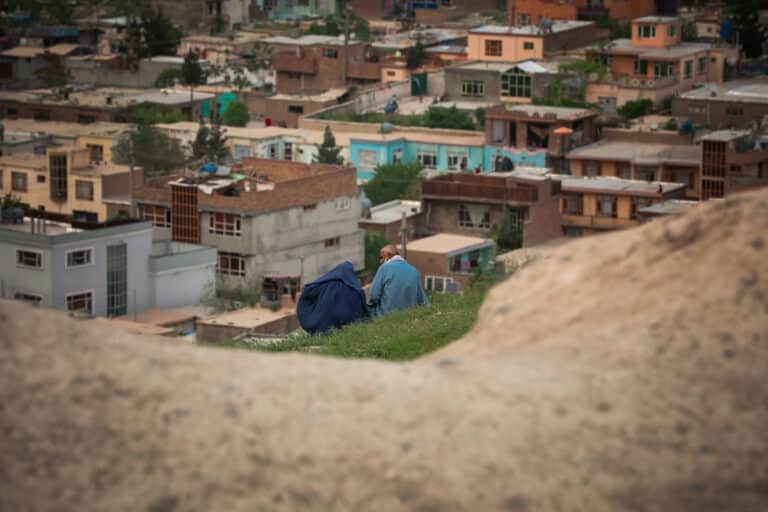Four ways you can help the people of Afghanistan right now

In little over a month since the US military withdrew from Afghanistan, the Taliban has taken control of major cities and installed itself in the presidential palace in Kabul. After almost two decades of war in the country, on 15 August 2021, the Taliban toppled the government, driving thousands of innocent people into a desperate race to escape the country.
The US has since announced plans to evacuate an initial group of approximately 2,500 Afghans from the rapidly deteriorating situation, but at least 20,000 Afghans had applied for the special visa as of mid-July, according to the White House. Many of these applicants have been stuck in bureaucratic limbo since, waiting for visa approval and stymied by unclear or nonexistent communication from US officials. Those who have been lucky enough to receive visas face other significant hurdles, from the danger of travelling long distances across the country to reach Kabul airport to being asked to pay for their plane tickets in cash.
While public outrage may not be enough to pressure the Biden administration to expedite evacuations for those in the immigrant visa programme, it could alternatively force the administration to consider accepting as many refugees as possible. This would also include those who didn’t aid the US military but still fear punishment or death for various reasons, perhaps because they support a democratically-elected government, are a girl or woman who’s sought employment or education, or identify as LGBTQIA+.
However, it’s clear that until further action is taken by the US (as well as the international community as a whole) many innocent Afghan civilians will suffer under the Taliban’s new rule—in particular, women and children. It’s easy to feel helpless about the situation. While lobbying elected officials can help address the plight of Afghan refugees, here are some other ways you can aid them right now.
1. Amplify experts' and activists’ voices
This one is simple but often gets forgotten. Few of us are actually experts in Afghanistan or Middle Eastern politics. Don’t take up unneeded digital space. Share the voices and knowledge of the people who know what they are talking about rather than your own.
1) If you are not an expert on #Afghanistan, have not been keeping up with what has been occurring, and are not directly impacted by what is happening don't share your unsolicited opinions and takes.
— Bushra Ebadi (@Bushra_Ebadi) August 14, 2021
Donate cash or airline points to help refugees purchase a flight
There are a number of nonprofit organisations out there, like Miles4Migrants, which uses cash, vouchers and air mile donations to help transport people out of areas impacted by conflict or persecution safely. Miles4Migrants takes the donations it collects and works with other nonprofit and government agencies to help those vulnerable individuals get a flight to safety.
The organisation recently tweeted that it was running out of cash and airline points donations to meet the overwhelming need coming from thousands of Afghan refugees. Donate if you can.
A better look at why we're receiving so many URGENT requests to fly Afghan families to safe homes. With flight requests pouring in, *we're quickly running out of miles & points to keep up.* Can you help fund a family's flight to safety?
— Miles4Migrants (@miles4migrants) August 12, 2021
MOST NEEDED: Chase, Amex, Air Canada, cash pic.twitter.com/6O41lVAiiN
Support Afghan independent media organisations and, in particular, Afghan women journalists
Truth and transparency are needed now more than ever when it comes to the reporting of the unfolding events in the region. Not only to support Afghan journalists and their voices, but so that this history is documented for years to come. Consider supporting Rukhsana Media, a journalist group staffed by women who are doing some amazing reporting right now.
Support efforts to resettle Afghan refugees in their new communities
Mai El-Sadany, a human rights lawyer, tweeted a thread explaining how you can participate locally in helping Afghan refugees resettle in the West. As managing director as well as legal and judicial director for the Tahrir Institute for Middle East Policy (TIMEP), she pointed towards initiatives in Canada and the US working to provide refugees with essentials needed to resettle into the community, from basic goods to housing. If you want to donate goods for Afghan refugees in your local community, try finding and using local and regional Facebook groups.
DMV Friends: 2,500 Afghans are expected to arrive and be resettled in the next few weeks. Lutheran Social Services (National Capital Area) has put out a call for those willing to assist in resettlement with their time, donations, and efforts.
— Mai El-Sadany (@maitelsadany) August 15, 2021
More here: https://t.co/SCHB2VxzP1 pic.twitter.com/U2GQ73ayc4
This is a constantly evolving situation—as more becomes clear over the following days and weeks, there will undoubtedly be alternative ways you can help popping up. In a whitewash of information, be aware of misinformation that is already starting to circulate. Along with these four things you can do right now, it’s also crucial to stay informed.





